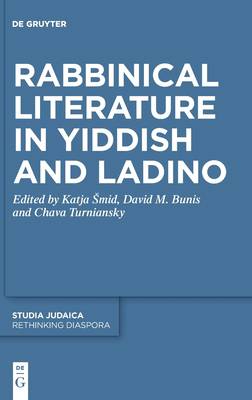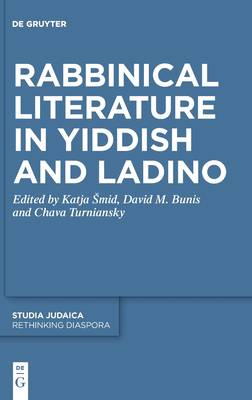
Bedankt voor het vertrouwen het afgelopen jaar! Om jou te bedanken bieden we GRATIS verzending (in België) aan op alles gedurende de hele maand januari.
- Afhalen na 1 uur in een winkel met voorraad
- In januari gratis thuislevering in België
- Ruim aanbod met 7 miljoen producten
Bedankt voor het vertrouwen het afgelopen jaar! Om jou te bedanken bieden we GRATIS verzending (in België) aan op alles gedurende de hele maand januari.
- Afhalen na 1 uur in een winkel met voorraad
- In januari gratis thuislevering in België
- Ruim aanbod met 7 miljoen producten
Zoeken
Rabbinical Literature in Yiddish and Ladino
€ 121,45
+ 242 punten
Omschrijving
The volume offers a broad introduction to the rabbinical literature written in the two major traditional Jewish languages of Europe: Yiddish, the language of the Ashkenazic Jews of Eastern Europe, and Ladino (or Judezmo or Judeo-Spanish), the language of the Sephardic Jews of the Ottoman Empire and its successor states, Italy and the Austro-Hungarian Empire.The scope is wide-ranging. Some of the contributions highlight the lives and work of outstanding rabbinical figures who wrote in Yiddish or Ladino, and the crucial role they played in the transmission of rabbinical knowledge among the more popular sectors of their communities, as well as in the shaping of the Yiddish and Ladino reading public. Close attention is paid to long-established genres such as the highly-popular Biblical commentaries, as exemplified by Me-'am lo'ez in Ladino (1730-1899); prayer books and liturgical compositions in prose and verse; responsa collections; guides to religious observance; moralistic works; as well as modern genres having rabbinic content such as the periodical press that began to appear in the second half of the nineteenth century, when the Jewish communities of the Diaspora underwent radical cultural, religious, social and political changes.
Specificaties
Betrokkenen
- Uitgeverij:
Inhoud
- Aantal bladzijden:
- 390
- Taal:
- Engels
- Reeks:
- Reeksnummer:
- nr. 139
Eigenschappen
- Productcode (EAN):
- 9783111575360
- Verschijningsdatum:
- 1/09/2025
- Uitvoering:
- Hardcover
- Formaat:
- Genaaid
- Afmetingen:
- 156 mm x 234 mm
- Gewicht:
- 721 g

Alleen bij Standaard Boekhandel
+ 242 punten op je klantenkaart van Standaard Boekhandel
Beoordelingen
We publiceren alleen reviews die voldoen aan de voorwaarden voor reviews. Bekijk onze voorwaarden voor reviews.








